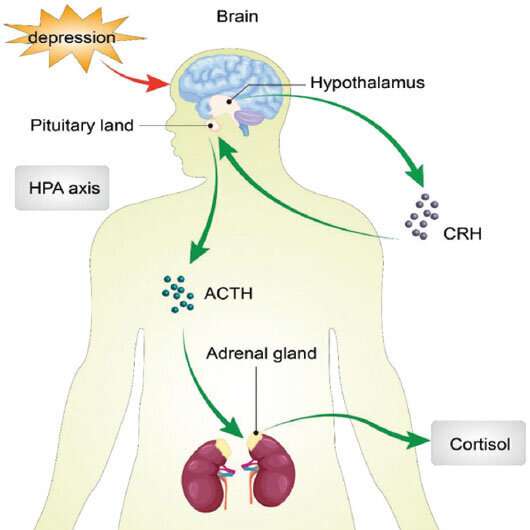This article has been reviewed according to Science X's editorial process and policies. Editors have highlighted the following attributes while ensuring the content's credibility:
fact-checked
trusted source
proofread
Study links hormones, blood sugar, blood lipids, and BMI to the severity of major depressive disorder and suicide risk

A study, published in the Bosnian Journal of Basic Medical Sciences, provides insights into the potential links between thyroid hormones, blood sugar, and lipid levels and their impact on major depressive disorder (MDD) patients. The collaborative effort brought together scientists from institutions across China, providing a large sample size and a broad scope for the research. Their findings highlight the crucial role these biological factors could play in MDD prognosis, the likelihood of suicidal behavior, and possible treatment options.
MDD is a debilitating mental health condition that affects millions of people globally. Often characterized by profound sadness and loss of interest in activities, MDD severely impacts the quality of life of those who live with it. While the current understanding of MDD is rooted in various genetic, biological, environmental, and psychological factors, the research team posited that more subtle physiological aspects, such as thyroid function and metabolic markers, could provide a deeper understanding of the disorder and its symptoms.
The research team conducted a detailed examination of first-episode MDD patients, focusing on factors such as thyroid hormones (TSH, TGAB, TPOAB), blood glucose, and blood lipid levels, among other elements. They collected and analyzed data using widely accepted medical instruments such as the Hamilton Depression Rating Scale (HAMD), the Hamilton Anxiety Rating Scale (HAMA), and the Positive and Negative Syndrome Scale (PANSS). By linking the physiological factors mentioned above with the severity of depressive and anxiety symptoms, as well as the occurrence of suicidal behavior, the researchers hoped to discern patterns and correlations that could improve the treatment and understanding of MDD.
A key finding of the study "Association between fasting blood glucose and thyroid stimulating hormones and suicidal tendency and disease severity in patients with major depressive disorder," was the association between thyroid hormones and MDD symptoms. Patients with varying degrees of depression exhibited abnormal levels of thyroid hormones. Notably, the study revealed a substantial link between thyroid hormones and the occurrence of suicidal behavior. These findings echo those from other studies that showed a relationship between abnormal thyroid hormone levels, MDD, and anxiety.
The research also identified metabolic disorders such as disrupted blood sugar and lipid levels as potential risk factors for MDD. The team found that MDD patients exhibited higher levels of fasting blood glucose compared to those without the disorder, and this was linked with a heightened risk of suicide. It was also revealed that MDD patients who had higher lipid levels (TC, TG, and LDL-C) were more likely to have severe symptoms and suicidal tendencies.
Furthering the study's implications, the researchers noted that while thyroid hormones and blood sugar could serve as biomarkers for MDD and suicidal behavior, anxiety symptoms also played a significant role. MDD patients who exhibited severe anxiety symptoms were found to have a higher incidence of suicide attempts and psychiatric symptoms.
The study concluded that thyroid hormones, blood sugar, blood lipids, and even the BMI index can impact the severity of MDD and the likelihood of suicidal behavior. The research team advocated for regular monitoring of thyroid function and blood sugar levels in MDD patients after diagnosis to prevent potential risks. However, while the findings were significant, the team acknowledged the study's limitations, including its cross-sectional nature, which prevents a determination of a causal relationship. Also, the study did not account for external factors such as environment and income, nor did it explore other potential triggers for suicidal behavior in MDD patients.
The real-world implications of this study are vast. As we continue to navigate the complexities of mental health, research like this not only advances our scientific knowledge but also opens up potential pathways to better mental health care. By identifying new biomarkers for conditions like MDD, we move one step closer to a future where treatment can be tailored to the individual, and prevention strategies can be more effectively implemented.
The authors are optimistic that the insights gained from this study promise to contribute meaningfully to the conversation surrounding mental health treatment and prevention. As researchers continue to unravel the mysteries of MDD, there is a hopeful anticipation that each discovery brings us closer to a world where the burden of this disorder is significantly lessened.
More information: Weiting Liu et al, Association between fasting blood glucose and thyroid stimulating hormones and suicidal tendency and disease severity in patients with major depressive disorder, Bosnian Journal of Basic Medical Sciences (2022). DOI: 10.17305/bjbms.2021.6754



















